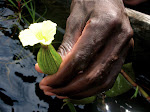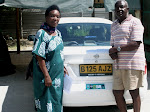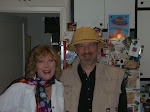




July 9, 2008
Maun
Gerald and Lally Warren will celebrate their 26th wedding anniversary in August, but, as Gerald told guests in Lobatse on Sunday, they are “still in their honeymoon phase.”
Was my interminable bus ride to attend their 25th wedding anniversary party worth it? You bet it was.
If the uploading on the blog works, you’ll see photos of Lally in a blue shawl and later in her wedding dress, and you’ll see the bride and groom kissing. You’ll see the traditional dancers from the village of Kanye and the Indian neighbors who performed a lovers’ dance as a gift to the couple. The baby is a cheerful friend I made at the party. Her name is Goone – “unto Him” or “unto the one” is the meaning. I wanted to take her home with me, but I had to settle for tending her an hour.
How is it that a couple can stay together more than 25 years anywhere on the globe in this era and in Botswana, where many people opt never to marry at all but insist on having children together? Gerald and Lally say it’s about finding the right person who is, above all, a friend and a spiritual companion, and, according to Lally, it’s about being “a professional coward.” She said neither she nor Gerald would dare make a big decision without consulting the other. That’s not always the case in Botswana, she told guests. Some women find a stranger at the door to announce he is the new owner of her house; the woman’s husband has decided to sell the house and it is news to her.
The anniversary celebration was a tribute to traditions in the Botswana culture and a plea for transformation, to a world in which men and women will be viewed equally and where the Batswana tradition of honoring marriage between one man and one woman for life can be renewed. Gender equality is after all a major tenet of Gerald and Lally’s Baha’i faith. The ceremony was filled with Baha’i prayers and blessings.
Their party first was a re-enactment of a traditional Botswana courtship and wedding. I found myself in the middle of the festivities as one of the actors. Women were chosen to be Gerald’s family, I among them. We wrapped ourselves in shawls under an unforgiving sun. (I must have looked awfully odd with my khaki safari hat pulled below my eyebrows and my cashmere paisley-print shawl from Provence draped around my shoulders. Talk about sweating.)
We had to travel beyond the gates to the house to find Gerald and the men sitting in a kgotla, a circle of democracy and decision-making. The bride was inside the red-brick house. One of the women in my line ululated, and there was a lot of that going on throughout the ceremony. But I don’t know how to do it: Somehow you make a high-pitched sound, vibrating your tongue back and forth as you shriek. I did the usual: I marched in step and kept my mouth shut. It had worked for me during the choir performances at the camps in the bush. It would work for me now.
We greeted the groom, who in theory was negotiating how many cattle would be given as a gift to Lally’s “family” in appreciation for the bride. During the ceremony, Gerald and Lally would stress that the “bride appreciation” has changed for the worse over time; too many young people use it as an excuse not to get married. They complain they don’t have the money or cattle to afford to marry. The anniversary celebration set the record straight: The bride appreciation, as it was in the days of old, can be a promise of cattle (or money) to be paid at any time during the marriage. The important thing is that two people love each other and have their parents’ blessing for the union.
We marched back into the courtyard to “meet” the bride’s “family.” We sat on the driveway on animal skins across from the women of the bride’s family. There was ululating as if in conversation across the divide, while we waited for the bride to come out of the house. This seemed to take a very long time. Or maybe it was the fact I was wearing a shawl in noonday sunshine.
We were told we must sit with our legs straight in front of us. Uh oh. That’s a pose we’re not used to holding for very long in the U.S. unless it’s in yoga class. I slumped. I leaned. I practically fell over on my side. Meanwhile, much older women sat primly, posture upright, legs straight in front, hands clasped in laps. (It reminded me how 15 years ago I had failed to sit still or primly in Korea at dinner tables low to the ground. My legs proved too long to fit anywhere, and I had trouble managing to sit cross-legged for more than 10 minutes at the same time I was fully concentrating on how not to fumble my stainless steel chopsticks and send them flying like missiles at my dinner companions.
“You have VERY long legs!” a little Korean boy announced to me in awe one night in Taegu. I guess that’s why I ended up in Korean strangers’ home videos as the giant big-boned gal come to town.) This straight-legged African seating was even more difficult.
But we managed. Lally came out wearing her blue shawl. Abandoning her air of confidence as a nurse and midwife in her usual life, she sat shyly, like a schoolgirl, in the place of honor. A representative set off to bring the groom. The groom’s group marched into the courtyard, and there were greetings all around, and an announcement that the bride appreciation was 20,000 Pula. Much hoopla! That’s a pretty penny and not a shabby offering from a retired primary school math teacher.
We all disbanded to move to our white plastic chairs. Relief. While traditional dancers and singers from the village of Kanye performed, Lally went into the house to transform herself into a bride in full white “goddess” gown with a pearl headpiece to top it off. One of the great moments of the day was when she was escorted from the door of her house like the leader of a parade, the traditional dancers marching behind with their ankle shells rattling. We guests loved it, and we celebrants were indeed a rainbow crew: Lally and Gerald’s three children and grandchildren; local Lobatse people, rich and poor; white Africans who drove up from South Africa for the day; a mixed-race couple from Gaborone who used to live in Atlanta when he worked at the headquarters for the Centers for Disease Control and Prevention; farmers and physicians alike. We all were witnesses to ritual and renewal.
And like any good ritual, the buffet food awaited and abounded: seswaa (Botswana barbecue), butternut, morogo (greens), pap, samp, salad, maize. I’m probably forgetting something. And we drank ginger beer from a big trash can, and lest you think otherwise, there is no beer in ginger beer. It’s nonalcoholic and delicious in a snappy way. (Baha’is don’t drink alcohol.)
I came away once again honored to know Gerald and Lally and grateful to my artist friend, Mary Jane, in Florida for making sure we were introduced in March. I know more about the culture of Botswana and the secrets of sustaining a marriage than I did a few days ago. Not a bad lesson in any culture and an invaluable reward for a roadtrip.
And how did I return to Maun?
As my friend, Kitso, a guide on time off from Xugana Island Lodge, said to me in a text message by cell phone, “U HAVE 2 B TOUGH 2 B A MOTSWANA LADY.” He was referring to my impatience in the art of bus riding. He messaged me “GUD” when I made it to Lobatse.
On Monday, I sent Kitso an SMS on my cell phone, “AM NOT TOUGH ENOUGH. TOOK PLANE BACK 2 MAUN 2DAY. HAPPY DAY! NO BUS 4 ME 2DAY.”
I am certainly no expert in marriage, but I think I got the overview of long-distance bus riding, along with a few tips: Don’t buy the fried chicken and chips (French fries) the hawkers try to sell you when the bus makes its quick stops. The chicken was probably cooked a day or two before and then rewarmed to release the redolent eau de grease. I didn’t make that mistake, thanks to my seatmate from Zambia’s warning. Truth is, I’m not tough enough to even consider trying the chicken from those corrugated roadside stalls. But I like to think I am.





No comments:
Post a Comment